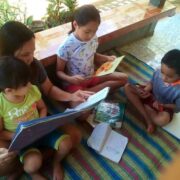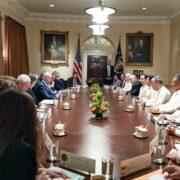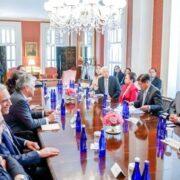
Manila, June 18, 2020 — The U.S. government, through the U.S. Agency for International Development (USAID), is providing Php126 million ($2.5 million) to help the Philippine government’s implementation of the Basic Education-Learning Continuity Plan to advance education delivery during the COVID-19 pandemic.
Since the COVID-19 emergency began, USAID and the Philippine Department of Education (DepEd) have collaborated to ensure teachers continue to teach and children still learn while schools are closed. USAID’s Php1.9 billion ($38.5 million) basic education project, ABC+: Advancing Basic Education in the Philippines, organized and facilitated consultations among education partners to identify and quickly roll-out innovative teaching and learning platforms.
“The U.S. government, through USAID, remains committed to ensuring young students have the opportunity to continue to learn despite the challenges that COVID-19 has created,” said USAID Mission Director Lawrence Hardy.
More than 27.7 million Filipino children and youth are at risk of significant learning loss due to extended school closures and disruptions during the pandemic. Students in early grades are particularly vulnerable to learning loss because they need significant support from their parents, teachers, and caregivers. This is also a critical stage in young children’s education as they develop literacy, numeracy, and social-emotional skills, which are foundations for lifelong learning.
In partnership with DepEd, USAID will provide teachers with instruction strategies and learning materials which are designed for use in both school and home learning environments. USAID will also assist DepEd to develop rapid, easy-to-use assessment tools for teachers to gauge and support students’ literacy skills once they are able to return to school.
To assist parents and caregivers, USAID will support the design of activities that parents can implement at home, and also strengthen the capacity of teachers to support parents in effective home learning activities to reinforce language comprehension. USAID will also partner with the private sector and local media companies to disseminate advice through radio broadcasts and other platforms on how to help children continue learning during school closures.
The United States has been supporting Philippine education programs for more than 50 years, and continues to work hand in hand with the Department of Education and other education partners in advancing DepEd’s Sulong EduKalidad program to improve the quality of education and learning outcomes in the Philippines.
USAID’s ABC+project, in partnership with the Department of Education, is improving the basic life skills of early grade students in Regions V and VI, and in the province of Maguindanao in the Bangsamoro Autonomous Region in Muslim Mindanao. By investing in quality education in the early grades, USAID is helping young Filipinos gain the knowledge and skills they need to unlock their full potential, succeed in life, and positively contribute to their families, communities and society.
About USAID
USAID is the lead U.S. government agency for international development and disaster assistance. In the Philippines, USAID partners with the national government to build a more prosperous and well-governed nation. For more information, visit https://www.usaid.gov/philippines or email infoph@usaid.gov.






